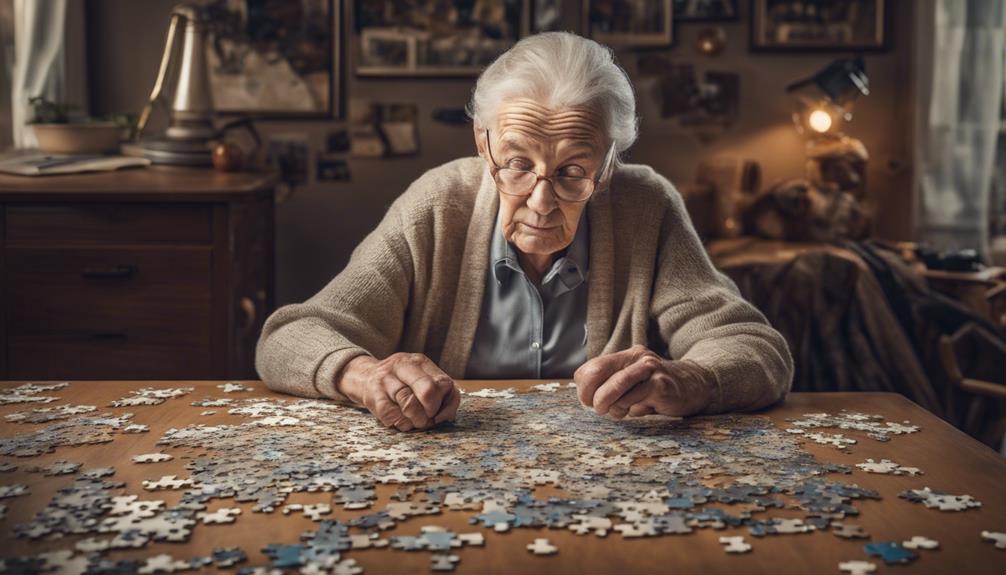In the world of caregiving, there is a popular phrase that goes, “a stitch in time saves nine.”
When it comes to managing stress while caring for individuals with dementia, the importance of engaging activities cannot be overstated. These activities not only benefit the person with dementia but also have a profound impact on the well-being of caregivers.
By incorporating stimulating and enjoyable tasks into the daily routine, caregivers can find respite and renewed energy in their roles.
The positive effects of these activities extend beyond mere distractions; they offer a sense of purpose and fulfillment that can make a significant difference in the caregiving journey.
Key Takeaways
- Brain games delay cognitive decline, reduce caregiver stress.
- Music and art therapy enhance communication, reduce agitation.
- Regular physical activities improve mood, benefit physical health.
- Outdoor activities and social engagement promote relaxation, combat isolation.
Engaging Brain Games for Dementia Care
How can engaging brain games benefit individuals providing dementia care?
Engaging in brain games has been shown to have numerous benefits for individuals with dementia. These activities, such as puzzles, crosswords, card games, and board games, aren't only enjoyable but also help improve cognitive function and memory recall. By stimulating mental activity, these brain games can potentially delay the progression of cognitive decline in individuals with dementia, providing a sense of accomplishment and satisfaction.
Moreover, playing brain games that involve social interaction can enhance the overall well-being of dementia patients. It offers a way for them to engage with others, fostering connections and creating meaningful moments. Additionally, brain-training apps tailored for dementia patients provide a fun and interactive approach to exercise the brain and enhance cognitive skills.
Incorporating brain games into daily routines can significantly impact both the individuals with dementia and their caregivers. It offers a positive and proactive way to engage with loved ones, reducing caregiver stress and promoting a sense of fulfillment in caregiving roles.
Music and Art Therapy Activities

Engaging in music and art therapy activities can significantly benefit individuals with dementia by providing emotional expression, cognitive stimulation, and opportunities for social interaction. Music therapy has shown to reduce anxiety, improve mood, and enhance communication skills in individuals with dementia. Through music sessions, accessing memories, enhancing cognitive function, and reducing agitation become possible. On the other hand, art therapy activities such as painting, drawing, and crafting stimulate creativity and offer a sense of accomplishment. These activities serve as a non-verbal form of expression, allowing individuals to communicate and connect with their emotions. Moreover, both music and art projects promote social interaction among individuals with dementia, creating a supportive and engaging environment. To illustrate the benefits further, let's look at a comparison between music therapy and art therapy activities:
| Music Therapy | Art Therapy |
|---|---|
| Reduce anxiety | Stimulate creativity |
| Improve mood | Provide sense of accomplishment |
| Enhance communication skills | Allow non-verbal expression |
| Cognitive stimulation | Emotional connection |
Physical Exercise and Movement Routines
Incorporating regular physical exercise and movement routines into daily care can have significant benefits for both caregivers and individuals with dementia. Engaging in physical activities such as walking, stretching, or chair exercises can help reduce caregiver stress by releasing endorphins that improve mood and decrease anxiety.
These movement routines not only benefit the caregiver's physical health but also enhance the quality of life for the person with dementia, providing them with a sense of accomplishment.
Outdoor and Nature-Based Activities

Exploring the outdoors and engaging in nature-based activities can offer a soothing retreat for both caregivers and individuals with dementia, providing a peaceful setting for relaxation and connection.
Outdoor activities like nature walks and gardening create a calming environment that helps reduce caregiver stress. Studies show that exposure to natural surroundings can lower cortisol levels, benefiting the overall well-being of caregivers.
For individuals with dementia, these activities can lead to mood improvement, decreased anxiety, and enhanced cognitive function, making the caregiving experience more manageable. The sensory stimulation provided by outdoor experiences, such as the sights, sounds, and textures of nature, promotes relaxation and reduces tension for caregivers.
Moreover, engaging in nature-based activities fosters a sense of connection with the environment, encouraging mindfulness and helping to prevent caregiver burnout. Embracing the outdoors not only benefits those with dementia but also supports caregivers in finding moments of peace and tranquility amidst their responsibilities.
Social Engagement and Group Activities
Social connections play a crucial role in alleviating caregiver stress, providing a sense of community and understanding during the caregiving journey. Engaging in group activities and social engagement can significantly impact a caregiver's well-being. Group activities offer not only shared experiences but also a connection with others facing similar challenges.
The support and camaraderie found in these settings can help combat feelings of isolation that often accompany caregiving responsibilities. Caregivers participating in social events and group outings may find a sense of belonging and understanding that can ease the burden of caregiving. This shared journey fosters a community where individuals can feel validated and supported in their roles.
Moreover, the mental well-being of caregivers can improve through regular social interaction, potentially reducing the risk of caregiver burnout. Embracing social engagement and group activities is a powerful way to address the challenges of caregiving and promote a healthier, more connected caregiving experience.
Frequently Asked Questions
What Are the Activities for Dementia Caregivers?
We understand the importance of finding activities for dementia caregivers. Engaging in music, art projects, brain games, and physical activities can benefit both the person with dementia and the caregiver.
Additionally, tapping into community resources for dementia-friendly activities and connecting with online caregiver communities can offer valuable social support and a platform for sharing experiences and tips.
How to Deal With the Stress of Caring for Someone With Dementia?
Dealing with the stress of caring for someone with dementia can be overwhelming. It's important to seek support from community resources and online communities. Practice relaxation techniques like deep breathing or meditation.
Stay informed about Alzheimer's effects and engage in educational resources. Take breaks for self-care to prevent burnout.
Communicate openly with healthcare professionals for guidance on managing stress effectively while caring for your loved one.
What Is One Way to Decrease Caregiver Stress?
One way to decrease caregiver stress is to prioritize self-care. Taking time for ourselves allows us to recharge and better support our loved ones with dementia.
It's essential to seek help when needed and not hesitate to delegate tasks. By managing our own well-being, we can provide more effective care and create a healthier environment for everyone involved.
What Are 3 Things to Never Do With Your Loved One With Dementia?
When caring for a loved one with dementia, it's important to remember certain key principles:
- Never argue or correct them, as it can cause frustration.
- Avoid rushing or pressuring them during activities to prevent stress.
- Do not leave them alone in unsafe situations for their safety.
- Avoid overwhelming them with complex language or too many choices to prevent confusion.
- Focus on empathy and validation in communication.
Conclusion
In the symphony of caregiving, activities for dementia are the harmonious notes that ease our burdens and lift our spirits. Like a gentle breeze on a hot summer day, these activities bring a sense of peace and joy to both the caregiver and the individual with dementia.
Let's continue to dance to the rhythm of these activities, finding solace and connection in the beautiful melody they create in our lives.









